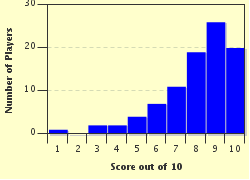Quiz Answer Key and Fun Facts
1. A British group with an American female vocalist bridged the gap between pop and new wave music with a Number 14 Hot 100 hit in 1980. What was the title of The Pretenders' debut single featuring these lines?
"Gonna use my arms, gonna use my legs
Gonna use my style, gonna use my sidestep
Gonna use my fingers, gonna use my, my, my imagination"
2. 1981 was the year that the first of the new breed from Great Britain climbed to the apex of the Billboard Hot 100. With help from the following lyric sample, can you identify this Number One hit that ultimately would rank at Number 32 on Billboard's year-end rankings?
"I wake up every mornin', I stumble out of bed
Stretchin' and yawnin', another day ahead
It seems to last forever, and time goes slowly by
Till babe and me's together, then it starts to fly
'Cause the moment that he's with me, time can take a flight
The moment that he's with me, everything's alright
Night time is the right time, we make love
Then it's his and my time, we take off"
3. In 1982, a musical "project" headed up by Londoner Alan Parsons finally scored a significant Hot 100 hit after several years of releases yielded no better than mediocre chart placements. Here's the entire second verse for your perusal.
"Don't say words you're gonna regret
Don't let the fire rush to your head
I've heard the accusation before
And I ain't gonna take any more
Believe me the sun in your eyes
Made some of the lies worth believing"
This song would peak at Number Three on the Hot 100 and be rated the 18th biggest hit of the year by Billboard. But what was it's title?
4. What song by The Human League, its debut release in America, topped the Billboard Hot 100 in July 1982 largely due to it being one of most heavily played music videos in MTV's rotation at the time? As such, it ranked as Billboard's 7th biggest hit of 1982. It was Number One in Britain eight months earlier. Does this lyrical hint bring back memories?
He sings:
"You were working as a waitress in a cocktail bar when I met you
I picked you out, I shook you up and turned you around
Turned you into someone new"
Following the chorus, she sings:
"I was working as a waitress in a cocktail bar, that much is true
But even then I knew I'd find a much better place
Either with or without you"
5. "When some cold tomorrow finds you
When some sad old dream reminds you
How the endless road unwinds you
While you see a chance take it
Find romance fake it
Because it's all on you"
These lines come from a Number Seven hit in 1981, a recording that would end the year ranked 68th on Billboard's annual countdown. It marked the long anticipated solo debut for an incredibly talented artist who featured in several popular groups in the 1960s and 1970s - Steve Winwood! Name that tune!
6. In February of 1983, a reggae flavoured song cracked the top 10 of the Hot 100. It was performed by Birmingham teenagers of Jamaican heritage and with their accented English, the lyrics probably didn't make sense to a lot of Caucasian North Americans. They kept singing about passing something on the left hand side. Do you know what it was?
7. In March 1983, stimulated by the video that was heavily played on MTV, an outrageously togged group with an androgynous lead singer became an overnight sensation in North America with a song that would rocket up the Hot 100 charts until settling in at Number Two and ultimately Number 12 for the entire year. They were Culture Club and of their listed hits below, which one was that debut release?
8. A Birmingham based band outdid Culture Club when their debut release in North America topped the Hot 100 in April 1983. The song was unique for the era in that it featured instruments like the banjo, accordion and fiddle rather than a synthesizer or other electronics. What song was it that seemingly channeled Bing Crosby with the oft repeated line "too-ra-loo-ra-too-ra-loo-rye-aye"?
9. A recording act with an androgynous lead singer... wait... I've already done this! No, ANOTHER group ultimately pipped Culture Club twice by a margin of one position. Their debut release in North America rose to the apex of the Hot 100, not Number Two, and ultimately became the 11th biggest hit of 1983 rather than 12th. I suspect the accompanying lyric sample will give it away but what song was this?
"Some of them want to use you
Some of them want to get used by you
Some of them want to abuse you
Some of them want to be abused"
10. The biggest Billboard hit of 1983 topped the charts for eight weeks and was listed in the Top 40 for five months. The group that performed it was not new to the American music scene already having had three top 10 hits dating back to 1980. However, this song, eerie as it was, elevated them to superstar status. Here's the lyrical hint (another give away), you select the correct title.
"Every move you make, every vow you break
Every smile you fake, every claim you stake (I'll be watching you)"
Source: Author
maddogrick16
This quiz was reviewed by FunTrivia editor
1nn1 before going online.
Any errors found in FunTrivia content are routinely corrected through our feedback system.

